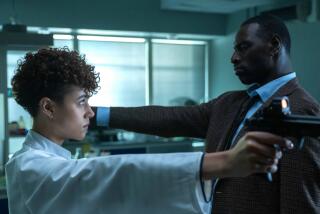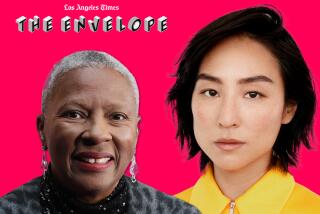Wong Kar Wai woos kung fu crowd with ‘The Grandmaster’
Wong Kar Wai is known as an international master of moody romance, making films filled with a yearning melancholy. His “In the Mood for Love” was the only film from this century to make the Top 25 of a recent Sight & Sound poll of the greatest films of all time. So news that he was making a kung fu film tracing the life of Ip Man, who would famously go on to train Bruce Lee, caught many of his fans off-guard.
Playing now in Los Angeles, the long-awaited film has already been the biggest commercial hit of Wong’s career in China, even with its unlikely combination of a rousing martial arts story and a moving tale of romantic longing.
Wong began his career as a screenwriter, frequently writing fantasy martial arts films. But he researched “The Grandmaster” story for about three years, traveling across China to learn of forms of martial arts. Shooting the film in an arduous 22 months over another three years, he worked with stunt choreographer Yuen Wo Ping, known for his work on “The Matrix” and “Crouching Tiger, Hidden Dragon,” with individual fight scenes taking months to capture on film.
None of his main stars practiced martial arts, and so Tony Leung, Ziyi Zhang and Chang Chen trained tirelessly for the film before and during production. Leung broke his arm while training, waited for it to heal and then broke the same arm again in the same spot on the first day of shooting, forcing the production to shuffle its schedule.
“I just wanted to make a kung fu movie of my kind,” Wong said of the film’s inspiration. “That’s why I needed to spend so much time, I have to understand the world of martial arts. And I feel I have to find my angle to tell the stories.”
Unlike martial arts film in the wuxia style, such as “Crouching Tiger, Hidden Dragon,” that are typically set in a fantasy pre-modern era, “The Grandmaster” is set against the specific backdrop of the political upheaval in China from the 1930s to the 1950s, including the Japanese invasion and civil war.
As Ip Man (Leung) trains in the martial arts style known as wing chun, marked by a fluid simplicity, he encounters — and fights — practitioners of other martial-arts styles. Among those is the woman known as Gong Er (Zhang), who has become sole inheritor of her father’s dynamic bagua fighting style, though circumstances conspire to keep the two from acting on the attraction between them.
PHOTOS: Hollywood backlot moments
During a recent rare trip to Los Angeles from his home in Hong Kong, Wong, 57, sat on the patio of a hotel in Beverly Hills, inhaling a steady stream of cigarettes and wearing his signature sunglasses. (He owns only one pair, he said, custom-made for him by a Japanese artisan who also makes samurai swords.) He is open and engaging, yet like his movies can take an unexpected turn toward something more enigmatic.
“The Grandmaster” is Wong’s first new feature film since 2007’s English-language excursion, “My Blueberry Nights,” in which a young woman drifts across America. “The Grandmaster” was first publicly shown in Los Angeles over the summer at a packed screening at the Motion Picture Academy hosted by Matthew Weiner.
Weiner introduced Wong by noting that his films “have a unique pace, an attention to visual detail, subtle humor and are most notably populated with characters whose behaviors are as rich in human scale as the environments they occupy.” If the connection between the men was not immediately apparent, it was as if Weiner could have easily been describing his own “Mad Men.”
Weiner added, “I watch his films and I connect to their honesty, their beauty and above all their originality. I, like most people who watch his work, become overwhelmed by an intimacy that I thought only existed in real life.”
Pursuing answers
For Wong, the idea of a serious kung fu film — “It’s hardcore,” he said — is not as unusual within his filmography as it might seem. In the interview, the day after the academy screening, when asked what to him makes a Wong Kar Wai film, he said simply, “Something that answers my questions.”
REEL CHINA: Coverage of the film industry in China
He added, “I have so many fascinations about this. How good is it, where do martial arts come from, what is the value of this? And when I finally finish the film, it’s like I have an answer. They have certain wisdoms that I think are lost today and I think should be revisited.”
Wong’s working style is frequently described as improvisational, leading to his notoriously long shoots and protracted editing process. He seems to prefer thinking that he is finding his film by making it, and despite the presence of stunt teams and large scale sets for the project, he made “The Grandmaster” in his own way.
“Wong Kar Wai is Wong Kar Wai,” said Leung, who has been working with the director for more than 20 years.
“It’s kind of an adventure for us every time,” said Leung of their ongoing collaboration. “Fortunately for me, this time I’m lucky to have a real guy to base the character on, and he gave me a lot of information for my preparation.”
The film’s cinematographer, Philippe Le Sourd, had previously worked with Wong on shorter projects, but this was the first feature film he shot for the director.
“We started step by step,” Le Sourd said of the film’s shoot, which found them traveling throughout China. “You don’t have a full script. You know when you’ll start, and each day you know the location. It’s almost building the story shot by shot. For Kar Wai, it is trying to discover it for himself.”
The film opening in the U.S. is 20 minutes shorter than what was released in China. (A version in between those two cuts was screened at the Berlin Film Festival.) For a filmmaker known for his exacting, relentless work in the editing room, he welcomed the chance to keep at it.
“I won’t say the U.S. version is the short version,” Wong said. “It’s not just shorter. I tell the story in a different way. In a way, it’s more linear, it’s a compact version.”
And though Wong said he does not know what his next film will be, he feels satisfied the years of work have come to fruition with “The Grandmaster.” “I know I’m not going to make many kung fu films,” Wong said. “This may be the only kung fu film I make, I don’t know. I want to put everything I know about kung fu films into this film.”
More to Read
Only good movies
Get the Indie Focus newsletter, Mark Olsen's weekly guide to the world of cinema.
You may occasionally receive promotional content from the Los Angeles Times.











